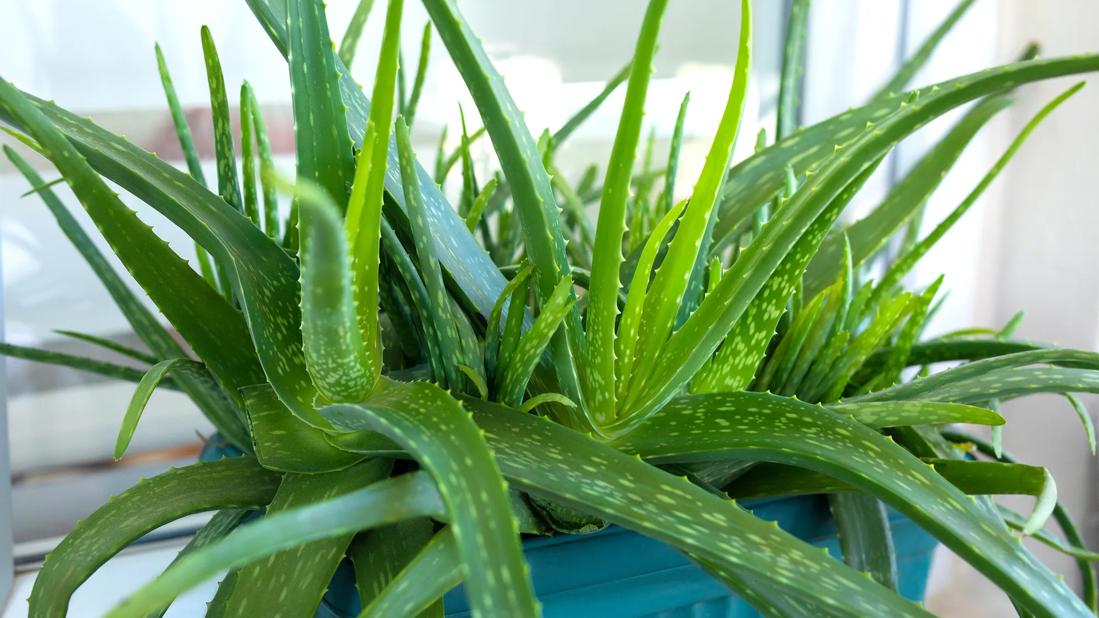This cooling gel can help soothe sunburned skin, but it can’t cure the burn

Image content: This image is available to view online.
View image online (https://assets.clevelandclinic.org/transform/8b7ea676-b615-4449-bd7a-bf7982335121/aloe-vera-plant-1475314230)
A large aloe vera plant
When you’ve spent too much time in the sun, aloe vera may be the first thing you reach for — and you’re not alone. People have been using it for centuries to help calm irritated skin. And there’s something undeniably comforting about that cool, smooth gel on a red, hot, stinging skin.
Advertisement
Cleveland Clinic is a non-profit academic medical center. Advertising on our site helps support our mission. We do not endorse non-Cleveland Clinic products or services. Policy
You’ll often see aloe vera gel on store shelves right next to sunscreen. But is it more than just a cooling sensation? Can it actually heal your sunburn?
Not really, says dermatologist Lindsey Moore, MD.
Here’s what Dr. Moore wants you to know about aloe vera — and how to use it safely when your skin needs some TLC.
Let’s make one thing clear: Aloe vera won’t reverse sun damage or make your sunburn disappear overnight.
But it can help you feel better while your skin recovers. It’s not a cure, but Dr. Moore shares how it may help in a few key ways:
“Aloe can soothe irritated skin and make you feel more comfortable,” she adds. “But it won’t undo the effects of UV damage.”
In fact, multiple studies have found that aloe vera is no more effective than a placebo when it comes to treating sunburn.
Still, that calming feeling is real — and for many people, that’s reason enough to use it.
If you decide to use aloe vera for your sunburn, here’s how to get the most relief:
Advertisement
“Whether it’s straight from the plant or from a bottle, both can work,” says Dr. Moore. The key is using something that’s available, gentle and non-irritating.
Here are your main options:
Skip the aloe if you’ve had a bad reaction — like a rash — before. And always read labels if you have allergies or sensitive skin.
Sometimes, a sunburn is more than just a little red skin. Aloe may help with mild sunburns, but more serious burns need medical attention.
Skip the aloe and contact a healthcare provider if you have:
Aloe vera won’t heal a sunburn, but it can make it more bearable. Just think of it as a soothing sidekick, not a miracle cure.
Dr. Moore emphasizes that time is the only true healer when it comes to sunburn. That’s why she spends a lot of focus talking about sun protection — not just treatment.
She recommends:
“Prevention is really the best treatment,” Dr. Moore emphasizes. “It’s much easier to protect your skin than it is to repair it.”
Next time you head outdoors, don’t forget your sunscreen — because when it comes to sunburn, prevention really is your best bet.
Advertisement
Advertisement

Sign up for our Health Essentials emails for expert guidance on nutrition, fitness, sleep, skin care and more.
Learn more about our editorial process.
Advertisement
Several conditions, like vitiligo and fungal infection, can cause a loss of pigmentation, leading to white spots or patches on your skin
You know it’s not good if you’ve been holding onto it for more than three years or if it’s changed in color, consistency or smell
Look for a UPF rating of 50+ for optimal protection against UV rays
A sunburn will leave you itchy and red, while sun poisoning can feel like an allergic reaction
A cool shower, aloe vera gel, anti-itch treatments and cool compresses can provide fast sunburn relief
SPF stands for ‘sun protection factor’ — it’s a measure of how much protection you’re getting before a sunburn is possible
This ‘poisoning’ is actually a severe sunburn that seems similar to an allergic reaction
When outside, protect your skin from damaging UV rays with a fresh layer of sunscreen at least once every two hours
Prioritize your health by managing stress, strengthening your social connections and getting quality sleep
Bolsters, blankets, pillows and blocks can offer extra support, stability and comfort
Allergies, postnasal drip, asthma or reflux could be to blame for a cough that won’t quit